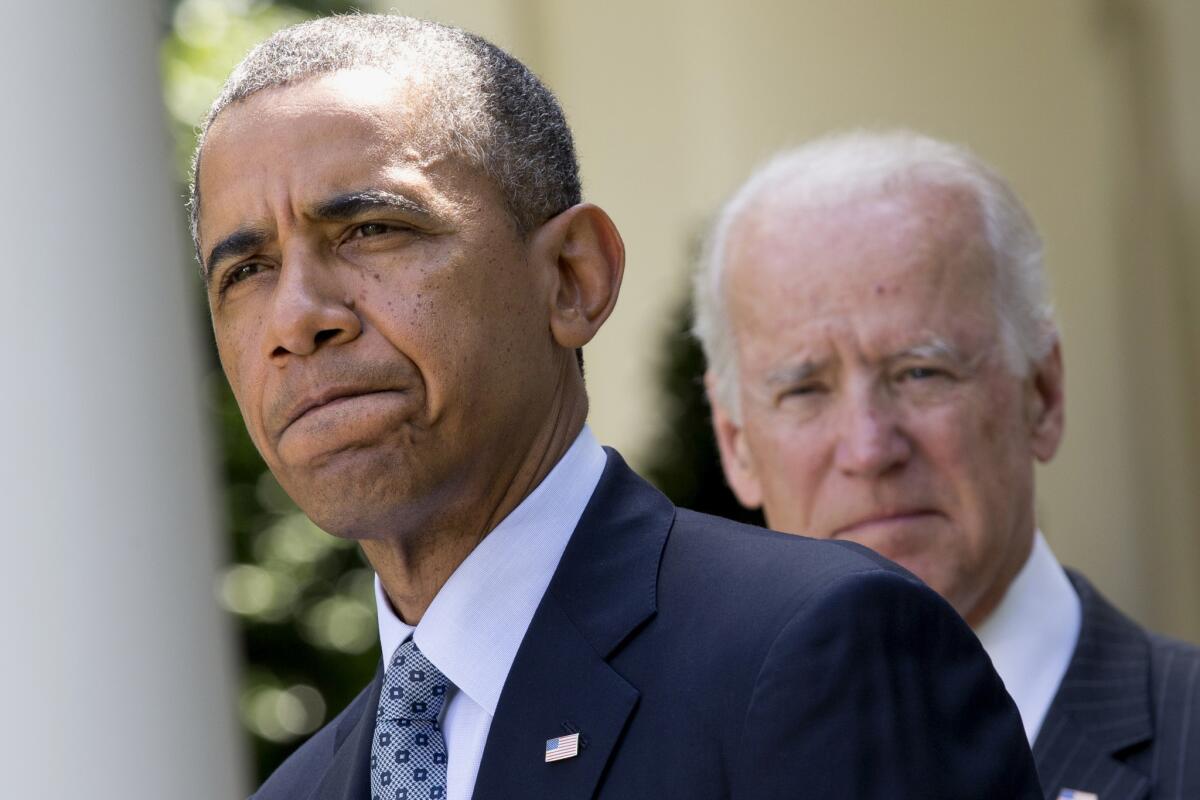Editorial: Immigration reform calls for leadership, not political calculation, without delay

- Share via
The most troubling aspect of President Obama’s decision to delay using executive action to change the nation’s immigration system is that it seems rooted in crass political calculation. In that, he has now joined House Republicans in putting politics ahead of the needs of the nation, which is not a particularly good move for a president trying to cement his legacy.
Immigration reform is a thorny issue, and we won’t rehash its nuances here. But nearly all the players recognize that fundamental change is needed. So why is it that there never seems to be a right time to get it done? Why, when push comes to shove, is it always immigration reform that gets elbowed aside? Sure, there are difficult politics involved, but for more than a decade now, those politics have stood in the way of badly needed action.
In June, with Congress still refusing to act, the president vowed to use the power of his office to make significant reforms to the system, saying he would do so at the end of the summer. Now, he says, he has decided to delay because of the recent surge of unaccompanied minors at the border. “The politics did shift midsummer because of that problem,” he said Sunday morning on NBC’s “Meet the Press,” adding that he wanted more time “to make sure that the public understands why we’re doing this, why it’s the right thing for the American people, why it’s the right thing for the American economy.”
That rings hollow; if anything, the surge has brought the system’s weaknesses into even starker relief — as well as Congress’ failure to fix it. The Senate has passed an immigration reform package, but House Republicans refuse to bring it to a floor vote. The House did approve the so-called Dream Act, which would have allowed permanent residency for some people brought to the United States illegally as minors. But the Senate failed to bring it to a vote. Obama then announced his Deferred Action for Childhood Arrivals program, adopting some elements of the Dream Act by granting two-year deferrals on immigration action to those who would have been covered by the act.
Ideally, immigration reform should be handled through the legislative process, preferably in a bipartisan manner. When a president is forced to act unilaterally, the system is not working well. But we share Obama’s frustration with a Congress that has failed to address the issue — most recently in ignoring his request for $3.7 billion to deal with the unaccompanied minors — even as those same politicians bray that the system needs fixing.
What exactly Obama intended to do by executive action was never announced, so it is impossible to weigh in on the merits. But this much is clear: Obama the candidate promised a proposal for immigration reform in his first year in office, a promise that went unfulfilled. Since then, his administration has set records for deportation, earning him the derisive nickname “deporter-in-chief.” Now, when the president finally seemed poised to act, he looked at the Senate election tote board and decided that more delay was in order. Why? Despite his protests to the contrary, White House officials acknowledge privately that the president wants to avoid galvanizing Republican opposition at the November polls and jeopardizing the Democrats’ narrow majority.
OK, we get it: The politics are treacherous. But ultimately, a leader has to fight for what he believes in and deliver on what he has promised.
Follow the Opinion section on Twitter @latimesopinion
More to Read
A cure for the common opinion
Get thought-provoking perspectives with our weekly newsletter.
You may occasionally receive promotional content from the Los Angeles Times.






